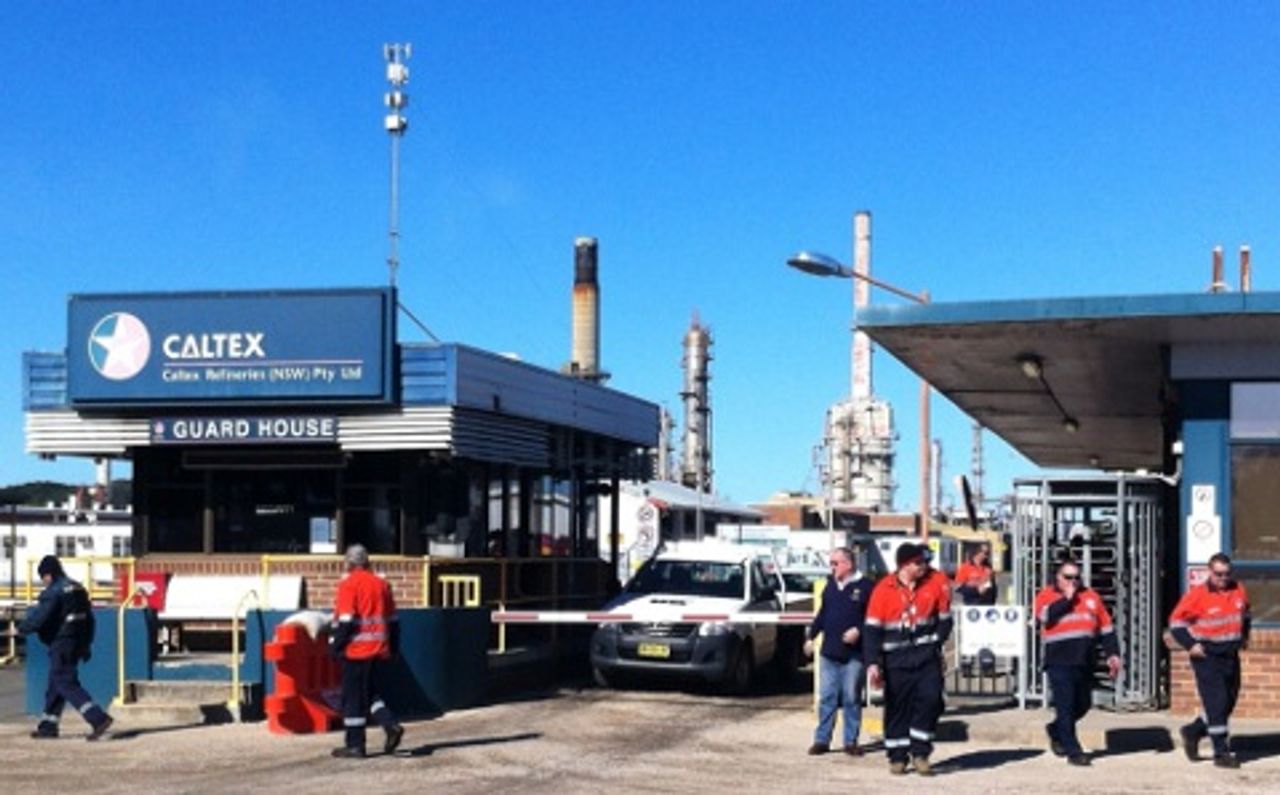The petroleum company Caltex announced yesterday that it will close its refinery in Kurnell, a southern suburb of Sydney, in the second half of 2014. The move will result in the destruction of 330 permanent jobs, and as many as 300 contracting positions.
The Kurnell site will be reduced to a petroleum importing and distribution centre. The company indicated that fewer than 100 workers will be retained following the closure of the refinery. The Kurnell facility has operated as a refinery for 57 years.
Announcing the closure of the refinery, Caltex blamed the high Australian dollar, increasing operational costs and a lower Caltex refiner margin. According to the company, the refinery lost $208 million in 2011 and $60 million in the first quarter of this year.
 Kurnell workers leaving plant
Kurnell workers leaving plantThe closure of the refinery is part of an international restructuring of the oil industry that has been accelerated by the global economic crisis. The Kurnell site, which processes around 125,000 barrels of crude oil a day, is unable to compete with large new Asian refineries that can handle more than 1 million barrels daily.
The closure of the Kurnell refinery follows Shell’s announcement last year that it was shutting its refinery at Clyde in Sydney’s Western Suburbs. Like Kurnell, that site is being transformed into a storage and distribution facility.
The federal Labor government immediately backed Caltex’s refinery closure and the axing of hundreds of jobs. Prime Minister Julia Gillard declared: “This is a refinery with ageing capital ... By the standards of the world it’s really quite a small refinery so not at an efficient scale ... Obviously the higher dollar has paid [sic] a role as well.”
The Gillard government and the trade unions are presiding over a vast restructuring of manufacturing and industry in line with the demands of the corporate and financial elite. Thousands of jobs are being destroyed and harsh new working conditions imposed in the name of boosting international competitiveness. In the past fortnight, Ford has announced the axing of 440 job cuts at its manufacturing plant in Victoria. Another 164 jobs are to go at an aircraft engine overhaul company co-owned by Qantas.
The closure is the end product of years of restructuring and job losses at the refinery imposed with the assistance of the trade unions. At every point, union officials have told workers to sacrifice jobs and conditions in order to keep the refinery open.
The closure will impact heavily on workers, many of whom have worked at the refinery for years.
A contract crane driver told the World Socialist Web Site: “It’s going to affect a lot of families. This place has kept the Sutherland Shire going for many, many years. I can’t believe the government won’t step in and do something about it … [It’s the] worst government we’ve ever had. Look at the way things are going, everything’s going through the roof! People can’t afford to live.”
 Pasquale Crisafulli
Pasquale CrisafulliPasquale Crisafulli, a maintenance worker, told the WSWS: “It’s been coming for a while, but they would never announce it officially. Blokes were prepared for it, but not to the extent that they would close it down in two years.
“A lot of guys have been working there for a long time. They’re probably going to find it very hard to find a job somewhere else because the work here is all that they know. I’m 56 and I will struggle to find another job. My age will go against me. Young workers with kids are going to struggle with their mortgages. It pays well here, but they’re not going to find work that pays that well anywhere else and they’re going to struggle to pay their mortgage off. It’s also going to affect a lot of small businesses around here that rely on the refinery to survive.”
Crisafulli explained that there had been round after round of restructuring and job cuts. “In 1998 they made half of the maintenance workers redundant. Then there was another wave of redundancies, and another after that. As of two years ago, Caltex has only kept five of their maintenance people and the rest are contractors.”
The unions have been complicit in every stage of the restructuring process. In response to the closure, the Australian Workers Union (AWU), which covers refinery operators, has announced it will take out advertisements in the media denouncing Woolworths, which is a Caltex partner and calling for a boycott of the grocery store giant. The so-called campaign is not aimed at defending jobs but diverting the anger of workers and ensuring an “orderly closure” of the refinery.
AWU national secretary Paul Howes declared that the closure and the import of petrol was “not in Australia’s national interest”. The union’s denunciation of Woolworths as “foreign fuel people” and its “buy Australian” nationalism is a recipe for the subordination of workers to Australian corporate interests. It serves to divide workers facing similar attacks on jobs and conditions, often by the same corporations, along national lines.
Workers should take a stand to defend all jobs and conditions. That means a complete break with the trade unions that have presided over the destruction of thousands of jobs throughout the manufacturing industry. It is necessary to establish an independent rank-and-file committee, to occupy the refinery and to turn out to other sections of workers facing similar attacks in Australia and internationally.
Such a struggle will inevitably involve a political fight not only against the company but against the Gillard government and the unions on the basis of a socialist program. The banks and major corporations should be placed under public ownership and the democratic control of the working class as part of the reorganisation of the Australian and world economy to meet the social needs of the majority, not the profits of the wealthy few. Only in that way can decent, secure jobs be guaranteed for all.
